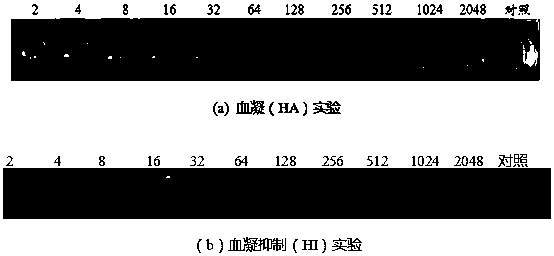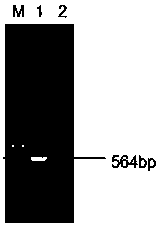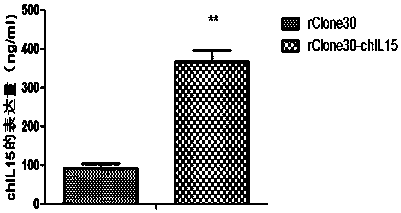Chicken Newcastle Disease Vaccine Virus Strain rclone30‑chil15 and Its Application
A technology of chicken Newcastle disease virus and strains, which is applied in the direction of antiviral agents, virus/bacteriophage, virus antigen components, etc., can solve the problem that chickens cannot get immune protection, shorten the immune blank period, improve immune effect, and improve immune protection rate effect
- Summary
- Abstract
- Description
- Claims
- Application Information
AI Technical Summary
Problems solved by technology
Method used
Image
Examples
Embodiment 1
[0038] Embodiment 1, preparation of rClone30-chIL15 virus liquid
[0039] 1. Construction of recombinant plasmids
[0040] 1. Synthesize the double-stranded DNA molecule shown in sequence 1 of the sequence listing.
[0041]In the sequence 1 of the synthetic sequence list, the 1st to 6th nucleotides from the 5′ end are the recognition sequence of the restriction endonuclease SacII, the 9th to 14th nucleotides are the Kozac sequence, and the 15th to 578th nucleotides It is the coding gene of chIL15 polypeptide, and the 579th to 584th nucleotides are the recognition sequence of the restriction endonuclease MluI;
[0042] 2. Double-digest the double-stranded DNA molecule obtained in step 1 with restriction enzymes SacII and MluI, and recover the digested product;
[0043] 3. Digest the pBrClone30 plasmid with restriction endonucleases SacII and MluI, and recover the vector backbone fragment, which is about 16000bp in size;
[0044] 4. Ligate the digested product of step 2 with ...
Embodiment 2
[0055] Example 2, Detection of the expression level of chIL15 in the virus fluid
[0056] 1. Inoculate DF-1 cells in the logarithmic growth phase on a six-well plate, infect the rClone30-chIL15 virus solution prepared in Example 1 at a dose of 0.1 MOI (rClone30-chIL15 virus solution is diluted with complete DMEM medium), 37°C Incubate statically for 1 hour, wash with complete DMEM medium three times, add complete DMEM medium containing 1 μg / mL trypsin and place in 5% CO2, 37°C for 48 hours, then freeze and thaw repeatedly 3 times, and collect supernatant by centrifugation liquid;
[0057] 2. Replace the rClone30-chIL15 virus solution with the rClone30 virus solution prepared in Example 1, and the others are the same as step 1;
[0058] 3. Use the chIL15 kit (Antibodies online, ABIN414131) and operate according to the instructions to detect the concentration of chIL15 in the supernatant obtained in step 1 and the supernatant obtained in step 2;
[0059] see results Figure 4...
Embodiment 3
[0060] Example 3, Dynamic growth curves of rClone30-chIL15 virus and rClone30 virus in host cells
[0061] 1. Inoculate DF-1 cells in the logarithmic growth phase on a six-well plate, and inoculate the rClone30-chIL15 virus solution prepared in Example 1 (rClone30-chIL15 virus solution diluted with complete DMEM medium) at a dose of 0.1 MOI in Cell monolayer, using complete DMEM medium containing 1 μg / mL trypsin, placed in 5% CO2, 37°C for static culture for 96 hours, and the supernatant was taken every 24 hours and measured for TCID 50 ;
[0062] 2. The rClone30 virus solution prepared in Example 1 was used instead of the rClone30-chIL15 virus solution, and the rest were the same as step 1.
[0063] see results Figure 5 . The reproduction titer of rClone30-chIL15 virus was consistent with that of rClone30 virus. The results showed that the proliferative ability of empty vector rClone30 was not changed after inserting exogenous chIL15 gene.
PUM
 Login to View More
Login to View More Abstract
Description
Claims
Application Information
 Login to View More
Login to View More - R&D
- Intellectual Property
- Life Sciences
- Materials
- Tech Scout
- Unparalleled Data Quality
- Higher Quality Content
- 60% Fewer Hallucinations
Browse by: Latest US Patents, China's latest patents, Technical Efficacy Thesaurus, Application Domain, Technology Topic, Popular Technical Reports.
© 2025 PatSnap. All rights reserved.Legal|Privacy policy|Modern Slavery Act Transparency Statement|Sitemap|About US| Contact US: help@patsnap.com



